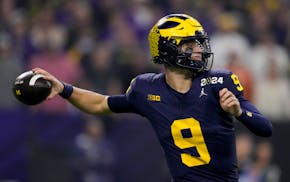Had Terry Ryan been better looking and more egotistical, he might, for his adept management of an underfunded franchise, have become the subject of the movie "Moneyball." In fact, "Moneyball" author Michael Lewis has admitted he considered the Twins as a subject before settling on the Oakland A's and the flamboyant Billy Beane.
Beane was played in the movie by Brad Pitt. Ryan might have had to settle for William H. Macy in a skullcap.
Ryan's savvy is the reason the Twins became a model franchise. He is the reason they play in Target Field today. It took Ryan three years as Twins general manager to learn the art of the deal. His replacement, Bill Smith, has not displayed a learning curve of similar shape.
Ryan performed poorly during his first three years as Twins GM. Then, from February of 1998, when he traded Chuck Knoblauch for a Yankees ransom, to December of 2005, when he traded three pitchers he didn't want for Luis Castillo and Alexi Casilla, Ryan was the best operator in the game. If he shook the hand of a fellow GM, he wound up taking his watch plus three prospects.
Smith took over for Ryan four years ago. He has presided over a winning team in three of his four seasons, but this season's epic collapse has revealed the mold and rot behind the franchise's drywall.
When it comes to major trades, Ryan almost always won, and Smith almost always has lost.
Ryan, too, struggled at first. In 1995, he traded four quality pitchers -- Scott Erickson, Kevin Tapani, Rick Aguilera and Mark Guthrie -- for nine prospects. Only one became a competent big-leaguer -- Ron Coomer.
Ryan's trade of Knoblauch to the Yankees changed the direction of the franchise.
The players he received in the Knoblauch trade, especially Cristian Guzman and Eric Milton, led to the early 2000s resurgence. In 1999, he made a trade in the Rule V draft, dealing Jared Camp for Johan Santana. In 2003, he traded a catcher he didn't need, A.J. Pierzynski, for Joe Nathan, Francisco Liriano and Boof Bonser.
Ryan traded Bobby Kielty for Shannon Stewart, Hector Carrasco for Lew Ford, a departing Rick Aguilera for Kyle Lohse, Eric Milton for Carlos Silva and Nick Punto. He made minor deals that brought in Joe Mays, Casilla, Jason Bartlett and David Ortiz in exchange for the proverbial bag of baseballs.
So far, Smith has yet to develop the kind of intuition or savvy that leads to sound deals.
He traded Matt Garza and Jason Bartlett for Delmon Young and Brendan Harris. That goes in the loss column. He traded top catching prospect Wilson Ramos for Matt Capps, who has proved to be a mediocre relief pitcher. He traded Johan Santana for a worthless collection of prospects. He traded J.J. Hardy for two relievers incapable of helping his lousy 2011 bullpen, then replaced Hardy with Tsuyoshi Nishioka, perhaps the worst position player in baseball.
Smith also has made good deals, helping the Twins win the 2009 and 2010 division titles by acquiring Orlando Cabrera, Jon Rauch and Carl Pavano. His acquisitions of Brian Fuentes and Capps in 2010 strengthened the Twins' bullpen for a playoff run that never occurred.
In Tuesday's Star Tribune, Twins owner Jim Pohlad was quoted as saying that his is not a "knee-jerk" organization. After watching this collection all season, it should look like he's doing Irish Dance around the offices.
The front office needs to add at least one experienced talent evaluator, and the minor-league system needs to be probed for weaknesses. Too many young players came to the big leagues unprepared.
While the Twins always will consider themselves a draft-and-develop organization, it was Ryan's trades that separated them from their competitors.
If Smith doesn't start emulating his predecessor, or surrounding himself with people who can guide him to better decisions, the Twins could occupy last place in the American League Central for years to come.
Jim Souhan can be heard Sundays from 10 a.m. to noon and weekdays at 2 p.m. on 1500ESPN. His Twitter name is Souhanstrib. • jsouhan@startribune.com

Souhan: These seven plays showcase Wolves' new defensive fire

Souhan: Wolves fans made Game 1 special. Now bring on Game 2.

Souhan: Should Vikings even consider McCarthy in NFL draft?

Souhan: NAW erases Suns' lead, Game 1 advantage with big performance


